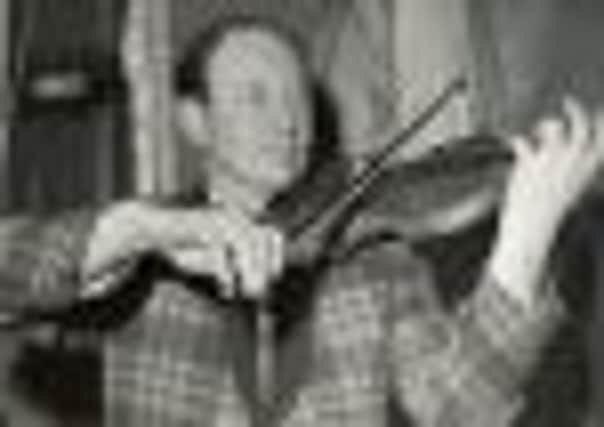Obituary: Ian Powrie, fiddler who became bandleader, famed for his White Heather Club appearances


IAN Powrie was a young Perthshire ploughman whose brand of traditional Scottish country dance music would come to delight audiences around the world for decades. Best known for appearances with the White Heather Club, he began learning to play the fiddle at the age of five, first performed on radio aged 12 on Children’s Hour and, despite not picking up the instrument for several years during the Second World War, made his first broadcast as a bandleader in 1949.
He would eventually give up farming, in favour of becoming a professional musician and emigrate to Australia – twice.
Advertisement
Hide AdAdvertisement
Hide AdBorn in Perthshire, the year his father went to farm at Bridge of Cally, the family moved to Blairgowrie and then Coupar where Ian went to school at Bendochy.
His father, Will, was already well known in music circles and played the melodeon. Known as the Angus Ploughman, he also had a band and made numerous records. Young Ian was initially tutored in the fiddle by Coupar Angus newsagent Adam Rennie before taking lessons from Jim Ogilvie in Blairgowrie.
He later admitted that, while he never had to be asked to play, getting him to go to lessons was more of a problem. He was also forbidden from playing Scottish music in favour of concentrating on the classics but, along with other young ploughmen, he would often take part in spontaneous bothy nichts and ceilidhs.
In 1942, he volunteered for the RAF and did some pilot training in Britain, flying Tiger Moths in Derby, before being drafted to Canada to complete his training. He flew various types of plane until 1946 and never once played the violin during that time. “I felt the atmosphere was wrong for that sort of thing,” he later commented.
After Victory in Japan (VJ) Day he turned down the chance to sign on for forest ranger service or remain in the RAF and returned to farming, working with his father, who was then manager at Bankhead, Dupplin, for Lord Forteviot, as well as playing at dances at the weekends.
It was around the same time that Auchtermuchty-based accordionist Jimmy Shand began making an impact in country dance circles, and Powrie eventually took over and reformed his father’s band.
In April 1949, they made their first broadcast with Pam Brough on piano, Powrie’s brother Bill on accordion, Bert Smith on bass and Hugh MacIntyre on drums. However, they couldn’t afford decent transport and travelled to engagements in a “monstrosity” of a car before borrowing £600 from his father for equipment and a Morris 16. It eventually did 100,000 miles and never let them down.
There were several changes in the band between 1949 and 1952, the year Powrie married wife Leila. The band at the reception read like a Who’s Who of Scottish dance music, featuring Shand, Bobby MacLeod, Angus Fitchet, Jack Ewan and Bill Wilkie, along with Powrie’s brother Bill and their father.
Advertisement
Hide AdAdvertisement
Hide AdMuch of his own band’s success was as a result of their link with Robert Wilson on the Personal Appearance radio series. They also had him to thank for their break into records. When he suggested they try recording they told him they already had but without much success.
He thought that was simply due to inexperience and said he would contact his recording manager. He turned out to be George Martin, who looked after The Beatles. The band made a test recording, Bothy Ballads for the Gay Gordons, and it became one of their best sellers. But in 1960 Ian had to decide whether he was to be a fiddle player or a farmer. Andy Stewart had taken over from Robert Wilson, the White Heather Club was on the go and the whole band opted to turn professional. However, he couldn’t resist the chance to buy a farm near Auchterarder and would often still be driving tractors shortly before dashing off to performances.
His busiest year was 1962 and in 1963 the band accompanied Andy Stewart to Australia and New Zealand, as well as playing numerous theatres and television shows elsewhere.
In 1966, in an effort to enjoy a closer family life, he and his family emigrated to Australia and Jimmy Blue took over as bandleader. While living Down Under, Powrie was in great demand as both a fiddler and competition judge.
The family returned to Scotland in 1984 but emigrated again to Australia 15 years later, where Powrie died in Perth.
The music he created over 60 years continues to be enjoyed the world over, no doubt due in no small measure to the philosophy passed down from Powrie’s father to his superbly talented son: “It’s not what you play, it’s how you play it.”
ALISON SHAW